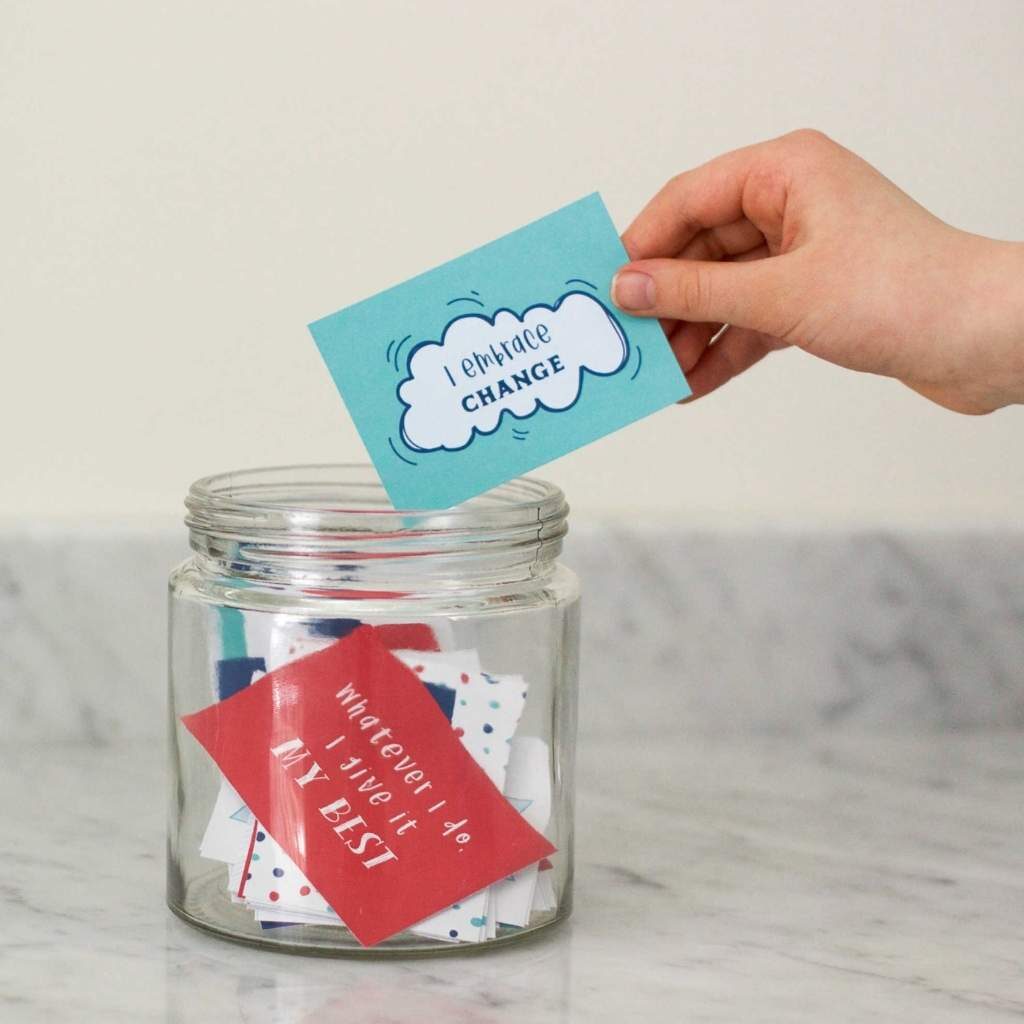101+ Positive Affirmations for Kids to Boost Confidence and Self-Esteem
Positive affirmations for kids are a powerful tool to help children develop a mindset of positivity and success. Here’s how to get started:
My daughter and I were sitting on the floor putting a puzzle together. We’d done this puzzle of mermaids swimming with fish countless times before, but the detailed section could get tricky. My daughter tried to shove a bluefin into a purple octopus. It wasn’t working no matter how many times she tried.
“Ahhh!” she shouted, flinging the pieces – and what we’d completed of the puzzle so far – across her bedroom. “I CAN’T DO IT.”
The words reverberated across the room. “I can’t do it.”
“Honey,” I said. “It’s okay. Take a breath.”
It took some coaxing, and a whole lot of patience, but she finally decided to try the puzzle again and eventually finish it.
I knew this frustration was partially a factor of her age. At 2 years old, she was learning so much. And new things? They could be challenging and frustrating.
But her words, “I can’t”, hit me particularly hard. I struggle with telling myself negative things about my own capabilities (parenting and otherwise), and have for as long as I can remember… and here I saw my daughter doing the same thing at the very impressionable age of two.
Why positive affirmations are important
I hated that, as a young child, my daughter was already telling herself, “I can’t.”
Enter affirmations, or positive mantras, something I’ve been practicing for a few years. Instead of using words like “I can’t,” positive affirmations for kids are practicing the words that empower and uplift us instead, such as “I can.”
By changing the words we tell ourselves, we can calm the negative chatter and, in turn, we talk to ourselves in a more positive way. Rather than bring us down, positive affirmations are the practice of lifting us up.
Studies show that our thoughts, on average, can be up to 70% negative. To top it off, we tend to have the same thoughts, over and over again, day after day, week after week.
One way to break this cycle of negative chatter is to do positive affirmations, but not do them here and there… but to make a practice of it so that our positive thoughts become another habit.
Our thought patterns start when we’re kids, and luckily for us parents, our young children are pretty darn good at speaking their minds when they want to. This provides us some insight into how they feel when they get frustrated or when they try something new.
Around the time of the puzzle incident, I decided to do my affirmations with my daughter. I knew how much I needed them to break my cycle of negative thinking, so I figured I’d help her start on the right foot by doing them with her at an early age. After all, it’s never too early to start a habit of positive thoughts.
Ready to do positive affirmations with your kids? These 101+ cards can help. Click here or the image below to learn more and get your own set.

Simply put the words you tell yourself matter. In other words, if you tell yourself you can’t, you’re completely right… because you never will! The word ‘can’t’ literally shuts the possibility down even before you’ve given yourself a chance.
But start saying what you can do? And start focusing on your positive qualities? It’s life-changing, because, your brain will believe what you tell it. It’s one of the reasons I love reading “The Little Engine That Could” with my kids. If you believe you can’t, you won’t. But if you believe you can, you will.
How to do affirmations with kids
First, pick out which affirmations for kids you’d like to say out loud together. Tailor this to each child, because what one kid needs to hear might be different from the other. While my oldest struggles with shyness, my youngest doesn’t, so for my oldest, positive affirmations like “I have a strong and important voice” are helpful. (Keep reading for some other ideas on positive affirmations for kids).
I’ll never forget the day I was getting ready in the bathroom and my daughter came in and asked, “Can we do ‘formations’?” Even though she was working on her words and pronunciation, she loved doing affirmations, whether we did them in front of the mirror or as we walked out the door.
That said, I do prefer the mirror. After all: eye contact is powerful in parenting, including when we look at ourselves. For us, I say the affirmation out loud, and ask my daughter to repeat after me. After we got in the practice of it, she started memorizing the affirmations and started saying them right along with me.
You can also make a practice of doing affirmations while looking at one other. Encourage your child to look you in the eye and repeat after you. For kids who need help calming down, eye contact along with affirming words can help quite a bit.
Another great way to do affirmations for kids, especially for older children who know how to read, is by creating flashcards. Write them down, decorate the cards, and make it a fun activity to do together. The bonus of this practice: the act of writing can reinforce the affirmation in their mind. Another bonus: they’ll practice reading too! It’s a win-win.
No matter which way you plan to do affirmations, make a habit of it and part of your routine. Sometimes my daughter and I do them when we brush our teeth before bed. Other times, we do them as we’re walking out the door and into the car… just find a way to fit them into your life!
Affirmations for kids: 101+ ideas
To get you started, here are 101+ affirmations for kids you can say with your children. I definitely recommend tailoring them to things or ideas you know your children are struggling with. Starting with the phrase of “I am” is powerful, but not required when doing affirmations, but keeping it in the present tense helps. The point of doing affirmations, after all, is to reframe your (and your kids’ ) negative thinking in the present moment.
All these suggestions are short, because, especially for younger kids, they’re easier to remember and repeat:
- I am loved.
- I am intelligent.
- I can experience beauty wherever I go.
- I am generous.
- Problems challenge me to better myself.
- I am open to possibility.
- I am a wonderful friend.
- I embrace my fears fully and calmly.
- I draw inspiration from life and my role models.
- I replace anger with compassion.
- I am creative.
- I am thankful for my blessings.
- I am capable.
- I am persistent.
- I am exactly where I need to be.
- I am worthy.
- I am perfect just the way I am.
- I am honest and trustworthy.
- I am thoughtful and kind.
- I am whole and complete.
- I am worthy of love.
- I am calm, relaxed and peaceful.
- I can do anything.
- I am healthy and am growing up well.
- I am compassionate.
- I am optimistic.
- I accomplish great results.
- I am joyful.
- I enjoy letting events unfold in good time.
- I am a great listener.
- I play an important role in the world.
- I like being punctual.
- I handle all my responsibilities and tasks well.
- I turn failures into opportunities for success.
- I am patient.
- I trust in my ability to solve problems.
- I trust my intuition.
- I manage my time well.
- I forgive myself for making a mistake.
- I believe in myself.
- All is well in the world.
- I enjoy spending time with myself.
- I have the courage to be myself.
- I enjoy being happy.
- I am persistent.
- I make like-minded friends easily and naturally.
- I am helpful.
- I am deserving of love, trust, and kindness.
- I care about others.
- I respect other people.
- I am thankful for being who I am.
- I see the good in myself.
- I believe I can be whatever I want to be.
- I am unique and special.
- I have a beautiful imagination.
- I believe in my dreams.
- Sometimes I make mistakes but I choose to learn from them.
- I deeply love and accept myself.
- I have faith in myself.
- I support others with love and kindness.
- I spread joy.
- I am in charge of my life.
- I have many unique gifts and talents.
- I express my ideas easily.
- I forgive others for their mistakes.
- I love my family and friends.
- I am a good friend to myself.
- I am brave.
- Every day and in every way, I get better and better.
- Wonderful and awesome things happen to me.
- I am proud of myself.
- I am always in the right place at the right time.
- I am friendly.
- I embrace change.
- I enjoy absorbing knowledge.
- I am confident.
- I listen to my inner wisdom.
- I trust myself to make great decisions.
- I can become whatever I want to be.
- Learning is fun and exciting.
- I am courageous even when things are unknown to me.
- I choose to look for the best way forward for myself.
- I work hard. I have loving, positive, and happy thoughts.
- I am protected.
- I can do whatever I focus my mind on.
- I enjoy discovering something new.
- I act responsibly.
- Whatever I do, I give it my best.
- Every day brings new opportunities.
- I am a good influence on others.
- I radiate love and compassion.
- I enjoy challenging myself with new ideas and possibilities.
- I am gentle with myself and others.
- I am caring.
- I accept compliments graciously and openly.
- I am forgiving.
- I believe in my abilities.
- I am strong inside and out.
- I am beautiful.
- I complete my school work on time every day.
- I have a strong and important voice.
Sign up for my email list – where I share one parenting tip each week – and you’ll receive a copy of fifty-four affirmations for kids as a free gift. (Click the image below to subscribe).
Our kids are always listening
I’ll be honest. There are some days that my oldest, now 4-years-old, doesn’t want to do affirmations. And that’s okay. I’ll still do them anyway, because I know she’s always listening…even when she pretends she isn’t.
But I know the positive affirmations are having an impact on her. She doesn’t get nearly as frustrated anymore. Sometimes I’ll even hear her say, “I can do it. I just need to practice,” as she’s working on a puzzle, or tracing letters, or zipping up her coat, or something that can otherwise lead to a whole lot of frustration.
She even encourages her 1-year-old brother now too: He once got upset when he knocked down his tower of blocks and I caught her saying to him, “It’s okay brother. We can just build it again!”

Liz SanFilippo Hall is a work-at-home mama who runs on caffeine and Reese’s peanut butter cups. While her two kids sleep (or, when she steals a minute or two for herself), she blogs about parenting and the work-at-home life on Oops and Daises, writes her soon-to-be children’s books, and helps other mamas feel beautiful and confident through her online makeup and skincare business.
You may also like:
The Seven Emotional Needs of a Child that Influence Confidence and Self-Esteem
To Raise Emotionally Intelligent Children, Stop Being Perfect and Start Being Real
The Secret to Raising Strong, Resilient Kids
How to Help Children Cope with Failure
What to do next…
1. Subscribe to Self-Sufficient Kids’ email list.
Like what you read here and want to learn more? Every Thursday I’ll send you one parenting tip about raising self-sufficient kids and creating the peaceful relationship you yearn to have with your child. Click here to sign up.
2. Take one of my quizzes!
Find out if you’re raising a self-sufficient kid (click here) or if you’re doing too much for your kids (click here). At the end of each quiz, you’ll be asked to provide your email address to see the results.
3. Get your kids started on chores.
Learn how to get your child started on chores (& keep them motivated + avoid power struggles) by enrolling in my Get Your Kids Successfully Started on Chores course. Click here to learn more and sign up.


